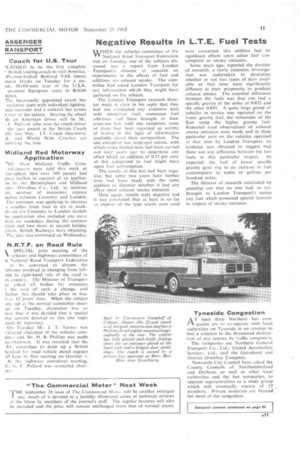Negative Results in L.T.E. Fuel Tests
Page 13

If you've noticed an error in this article please click here to report it so we can fix it.
WHEN the vehicles committee of the National Road Transport Federation met on Tuesday. one of the subjects discussed was a report from London Transport's director of research on experiments in the effects of fuel and additives on exhaust smoke. The committee had asked London Transport for any information which they might have gathered on the subject.
The London Transport research director made it clear in his reply that they -had. not conducted any extensive tests with smokeless fuel; numerous fuel additives had been brought to their attewion but, with one exception. none of these had been regarded as worthy of testing in the light of information available about their composition. The One exception was isopropyl nitrate, with which some limited tests had been carried out four years ago to determine any effect which an addition of 0.25 per cent. of this compound to fuel might have upon fuel consumption.
The results of this test had been negative. but some two years later further tests had been made with the same additive to discover whether it had any effect upon exhaust smoke emission.
Here again, results were negative and it was concluded that at least in so far as engines of the type which were used were concerned, this additive had no significant effects upon either fuel consumption or smoke emission.
Some years ago, reported the director of research. a fairly extensive investigation was undertaken to determine whether or not two types of dery available at that time were significantly different in their propensity to produce exhaust smoke. The essential difference between the fuels was that one had a specific gravity of the order of 0.832 and the other 0.845. A quite large group of vehicles in service was operated on the lower gravity fuel, the remainder of the fleet using the higher gravity fuel. Repeated road observations of exhaust smoke emission Were made and in these particular tests on the vehicles operated at that time by London Transport, no evidence was obtained to suggest that there was any difference between the two fuels in this particular respect. As expected, the fuel of lower specific gravity gave rise to an increase in fuel consumption in. terms of. gallons per hundred miles.
The director of research concluded by pointing out that no one had. as yet, brought to London Transport's notice any fuel which possessed special features in respect of smoke emission.










































































































































































































































































































































